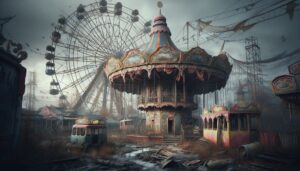 This morning I noticed a small fairground. The rides and stalls were still closed, waiting for the first visitors of the day. I like the hustle and bustle. The scents of popcorn and cotton candy, candied apples and roasted almonds – a unique blend that takes me back to the days when, with bright childlike eyes, I saw not a world of plastic, glass, and wire, but the miracle of living fairytales and fantasies.
This morning I noticed a small fairground. The rides and stalls were still closed, waiting for the first visitors of the day. I like the hustle and bustle. The scents of popcorn and cotton candy, candied apples and roasted almonds – a unique blend that takes me back to the days when, with bright childlike eyes, I saw not a world of plastic, glass, and wire, but the miracle of living fairytales and fantasies.
This morning, however, the fair did not look inviting. Covered structures and tents – stripped of their flickering, hectic lights – appeared somewhat ghostly. It almost seemed to me as if all the forgotten and abandoned dreams were hiding in the folds of the coverings, and wasn’t it so that in the rustling one could hear a faint lament? A quiet sobbing for a bygone era?
Perhaps it was the rain that fell that morning, giving the scene a touch of somber morbidity. I can’t say for sure, but what struck me in a melancholic way was the filth that seemed to cover everything.
But what was it then that I noticed? The dirt that we spread everywhere and that follows us like a sinister spirit, or is it the darkness that resides within one’s own soul and tries to reveal itself on the mirror of a surface? A recognition of one’s own emptiness of heart?
I like animals, and I feed them when I have something with me. In our cities, it’s frowned upon to feed pigeons. They say pigeons are dirty animals that spread diseases and filth. I see it differently. Yes, these animals live in filth, but we create that filth ourselves. Nature knows no filth. Within it, everything is reused and reintroduced into the cycle of life.
Leaves, animals, and feces fall to the ground, decompose, and form as compost the foundation for new life – one could say that life itself emerges from death. A cycle of life; that is nature, something many unfortunately do not understand. They confuse cause and effect.
A thing dies so that other things may live. Diseases, of course, exist as well, but the pathways of infection in nature are different from those in the city. Here, diseases are fostered by humans and their tendency to discard everything carelessly. What falls to the ground in the city is indeed filth and nourishes sickness.
And we humans tend to see everything that must exist amidst the filth we create as shabby. Whether it is an animal or a person. Few will feel compassion for someone lying drunk in their own vomit. No. They will be repelled, make fun of them. They do not see the person, the broken dreams, hopes, and unfulfilled happiness. They see only a bum lying in vomit.
What falls to the ground in cities – the highly praised centers of our „civilization“ – becomes dirt. It adapts to the world we humans have crafted, and I ask myself: how civilized are we really when dirt and filth accompany our steps?
And we do not only spread filth with waste, it is our deeds, our thoughts that carry filth into the world – it is not just garbage we see, it is a part of our way of life. A way we prefer to deny rather than address.
What falls to the ground in the forest becomes the foundation for new life; what we let fall, that is nothing but death and dull horror – and that is why our cities and our gazes are often so gray and murky. There is, in many ways, a lack of hope for rebirth…